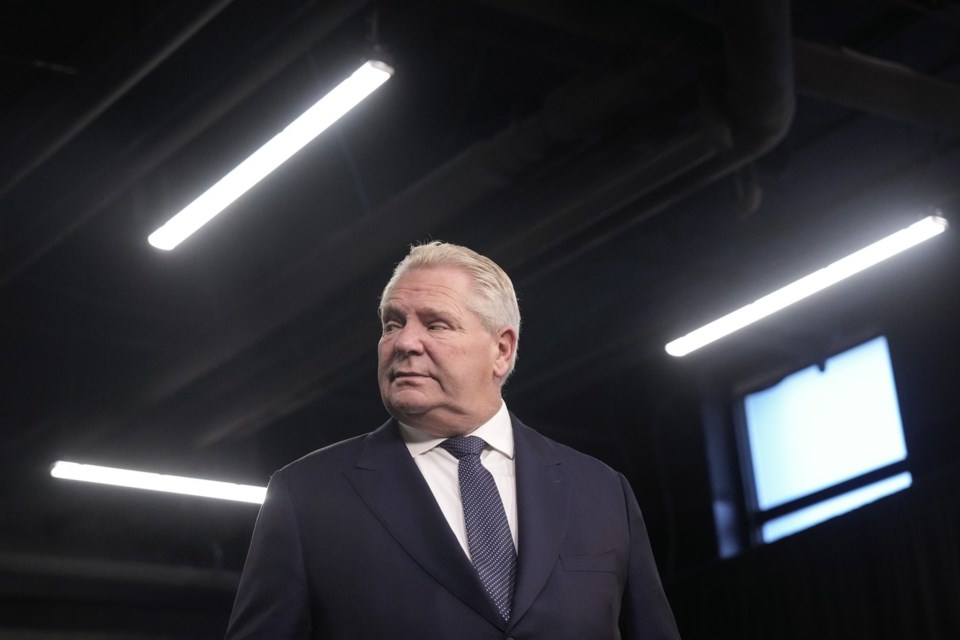TORONTO — Premier Doug Ford plans to call a snap election next Wednesday and send Ontarians to the polls on Feb. 27, The Canadian Press has learned.
Two senior government sources say Ford recently made the decision for the rare winter election after waffling for months.
The Canadian Press is not naming them so they can speak candidly about internal government deliberations.
The election had been set for June 2026, but Ford has said he needs a new mandate in order to deal with four years of a Donald Trump presidency in the United States.
Ford has said he expects Trump tariffs to hit Ontario particularly hard, specifically the auto sector, and he believes the province would need to spend tens of billions of dollars in order to keep the economy and hundreds of thousands of jobs afloat.
Opposition parties have said an early election is not necessary because they would support stimulus spending, and Ford — a premier with a majority government — already has a mandate to protect Ontario's interests.
Prior to the looming trade war with the United States, the opposition parties were positioning housing and health care, particularly a shortage of family doctors, as two main campaign issues. Both are still likely to get a lot of attention amid tariff talk.
All parties have been preparing for the possibility of an early election since last spring.
At the time, Ford was asked if he was speeding up the expansion of beer and wine sales to corner stores, at a cost of $225 million, in order to plan for an early vote. He refused to rule it out.
Election speculation ramped up in the fall as Ford continued to duck questions, at one point saying he would not hold one "this year," or in 2024. He did not then provide a reason for leaving the door open to a 2025 contest.
Opposition politicians suggested Ford was being opportunistic and wanted an election before a federal vote.
Polls had Pierre Poilievre and his Conservative Party of Canada well ahead and poised to crush Prime Minister Justin Trudeau's Liberal government. Ontario has a long history of electing governments of a different political stripe than the one in Ottawa.
The opposition, led by NDP Leader Marit Stiles, newly minted Ontario Liberal Party Leader Bonnie Crombie and Green Party Leader Mike Schreiner, also accused Ford of trying to get an election in before the conclusion of an RCMP probe into the government's decision to open up parts of the protected Greenbelt to development.
Ford had walked back the Greenbelt plan, but it caused turmoil internally, leading to the resignations of then-housing minister Steve Clark and his chief of staff.
In the provincial government's fall economic statement, Ford announced a $3-billion plan to send out $200 cheques in early 2025 to every Ontario taxpayer and their children. The premier framed it as a way to help Ontarians amid an ongoing affordability crisis, but the opposition said it was nothing more than a vote-buying scheme ahead of an election.
After Donald Trump won the presidency in November, Ford took centre stage among the country's premiers as they pressured Ottawa to prepare for the incoming president. Trump pledged to lay 25 per cent tariffs on Canadian goods, a promise that has yet to come to fruition, though the threat remains.
Trudeau's Liberal government imploded in mid-December after his finance minister, Chrystia Freeland, quit. A few weeks later, Trudeau told the country he would prorogue Parliament and step aside as Liberal leader while the party undertook a leadership race.
A new federal Liberal leader is set to be chosen March 9 and federal opposition parties have vowed to trigger an election if Parliament returns as scheduled on March 24.
That leaves Ford with a narrow window to squeeze in a provincial election ahead of a likely federal campaign.
It was only recently that Ford publicly offered a justification for considering an early election, saying that he needed a "mandate" from the people in order to spend billions of dollars should the threatened tariffs materialize.
That messaging evolved this week. When Trump did not lay tariffs on Day 1 of his presidency as many feared, Ford put it another way: he said he needed a new mandate to deal not just with tariffs but with four years of the new American president.
This report by The Canadian Press was first published Jan. 23, 2025.
Liam Casey and Allison Jones, The Canadian Press

